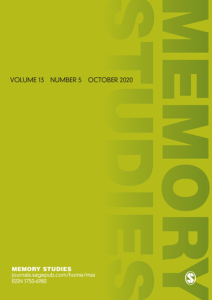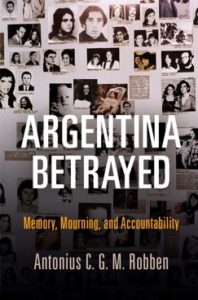SOLÉ, Qeralt (2020). The census of victims and databases
|
DATE
|
TITLE | AUTHOR | TYPE |
|---|---|---|---|
|
2020 |
Queralt Solé | Chapter |
|
DATE
|
TITLE | AUTHOR | TYPE |
|---|---|---|---|
|
2020 |
Queralt Solé | Chapter |
|
DATE
|
TITLE | AUTHOR | TYPE |
|---|---|---|---|
|
2020 |
Francisco Etxeberria, Juan Manuel Guijo y Juan Montero | Chapter |
|
DATE
|
TITLE | AUTHOR | TYPE |
|---|---|---|---|
|
2020 |
Memory worlds: Reframing time and the past – An introduction’ |
Marije Hristova, Francisco Ferrándiz y Johanna Vollmeyer | Article |
|
DATE
|
TITLE | AUTHOR | TYPE |
|---|---|---|---|
|
2020 |
Memory worlds: Reframing time and the past. Memory Studies Journal. Volume 13 Issue 5, October 2020 |
Johanna Vollmeyer, Francisco Ferrándiz and Marije Hristova | Journal |

Contents
Introduction. Memory worlds: Reframing time and the past – An introduction
Marije Hristova, Francisco Ferrándiz and Johanna Vollmeyer
Articles
Rainforest villages, eighteenth-century history
Richard Price
‘Putting heart’ into history and memory: Dialogues with Maya-Tseltal philosopher, Xuno López Intzin
R Aída Hernández Castillo
Making memories: Chinese foodscapes, medicinal foods, and generational eating
Nancy N Chen
The vernacular as method for memory and time: A philological and cultural exploration of Filipino concepts for Memory Studies
Jocelyn S Martin
Provincializing memory studies: The insistence of the ‘here-now’
Felicity Collins, Chris Healy y Susannah Radstone
Afterword
Afterword: Memory worlds in times of Corona
Astrid Erll
Winning paper of the 2019 MSA Excellent Paper Award
Remembrance Day for Lost Species: Remembering and mourning extinction in the Anthropocene
Clara de Massol de Rebetz
Book Reviews
The SAGE Journal of Memory Studies and MSA Outstanding First Book Annual Award
From Surviving to Living: Voice, Trauma and Witness in Rwandan Women’s Writing
Catherine Gilbert, reviewed by Hannah Grayson
Memory Activism: Reimagining the Past for the Future in Israel-Palestine
Yifat Gutman, reviewed by Alissa Boguslaw
Exhibiting Atrocity: Memory Museums and the Politics of Past Violence
Amy Sodaro, reviewed by Erin Jessee
|
DATE
|
TITLE | AUTHOR | TYPE |
|---|---|---|---|
|
2020 |
Marije Hristova | Article |
|
DATE
|
TITLE | AUTHOR | TYPE |
|---|---|---|---|
|
2020 |
Memory, Ethics and Education from the Mass Graves: beyond Mourning and Monuments |
Daniel Palacios González | Article |
|
DATE
|
TITLE | AUTHOR | TYPE |
|---|---|---|---|
|
2020 |
Las exhumaciones de los Caídos por Dios y por España: La gestión de los cuerpos |
Miriam Saqqa Carazo | Chapter |
|
DATE
|
TITLE | AUTHOR | TYPE |
|---|---|---|---|
|
2020 |
La lucha por la memoria histórica en España: más allá de la genealogía y las generaciones | Marije Hristova | Article |

The ruthless military dictatorship that ruled Argentina between 1976 and 1983 betrayed the country’s people, presiding over massive disappearances of its citizenry and, in the process, destroying the state’s trustworthiness as the guardian of safety and well-being. Desperate relatives risked their lives to find the disappeared, and one group of mothers defied the repressive regime with weekly protests at the Plaza de Mayo in Buenos Aires. How do societies cope with human losses and sociocultural traumas in the aftermath of such instances of political violence and state terror?
In Argentina Betrayed, Antonius C. G. M. Robben demonstrates that the dynamics of trust and betrayal that convulsed Argentina during the dictatorship did not end when democracy returned but rather persisted in confrontations over issues such as the truth about the disappearances, the commemoration of the past, and the guilt and accountability of perpetrators. Successive governments failed to resolve these debates because of erratic policies made under pressure from both military and human rights groups. Mutual mistrust between the state, retired officers, former insurgents, and bereaved relatives has been fueled by recurrent revelations and controversies that prevent Argentine society from conclusively coming to terms with its traumatic past.
With thirty years of scholarly engagement with Argentina—and drawing on his extensive, fair-minded interviews with principals at all points along the political spectrum—Robben explores how these ongoing dynamics have influenced the complicated mourning over violent deaths and disappearances. His analysis deploys key concepts from the contemporary literature of human rights, transitional justice, peace and reconciliation, and memory studies, including notions of trauma, denial, accountability, and mourning. The resulting volume is an indispensable contribution to a better understanding of the terrible crimes committed by the Argentine dictatorship in the 1970s and their aftermath.
Author: Antonius C. G. M. Robben
|
DATE
|
TITLE | AUTHOR | TYPE |
|---|---|---|---|
|
2019 |
María Laura Martín-Chiappe | Chapter |
El pasado bajo tierra: exhumaciones y políticas de la memoria en la España contemporánea en perspectiva transnacional y comparada
Proyectos Asociados:
HISTOFOR: PID2024-159223NB-I00 (2026-20289
MEM2OR: BICON24084 (2025-2026)
NECROPOL: PID2019-104418RB-I00 (2020-2024)
SUBTIERRO: CSO2015-66104-R (2016-2019)
UNREST: H2020 REFLECTIVE-5-2015, ref. 693523 (2016-2019)
PASADO BAJO TIERRA: CSO2012-32709 (2013-2015)
ISTME: COST Action IS1203 (2012-2016)
POLMEM: CSO2009-09681 (2010-2013)
SPBUILD: 7PM MARIE CURIE, ITN 238589 (2010-2013)
PIE CSIC: 200710I006 (2007-2009). Las políticas de la memoria en la España contemporánea
Centro de Ciencias Humanas y Sociales - Consejo Superior de Investigaciones Científicas.
Offices: 1F25 and 1F18
Albasanz 26-28.
Madrid 28037 (Spain)
politicasdelamemoria@gmail.com
